Why would you ever want to go hiking barefoot? I’m sure you’ve asked yourself this question numerous times whenever you come across articles or people who actually practice the same. They say that the most amazing things in this world are free, and so is barefoot hiking. It needs minimal preparation, absolutely no spending on items like boots and best of all, the experience will blow your mind.
Yes, you love the trek. There is nothing else you would rather be doing in your free time. But can you see yourself going down that long trail without shoes? Is it something you have considered, but did not muster enough courage to actually go through with it?
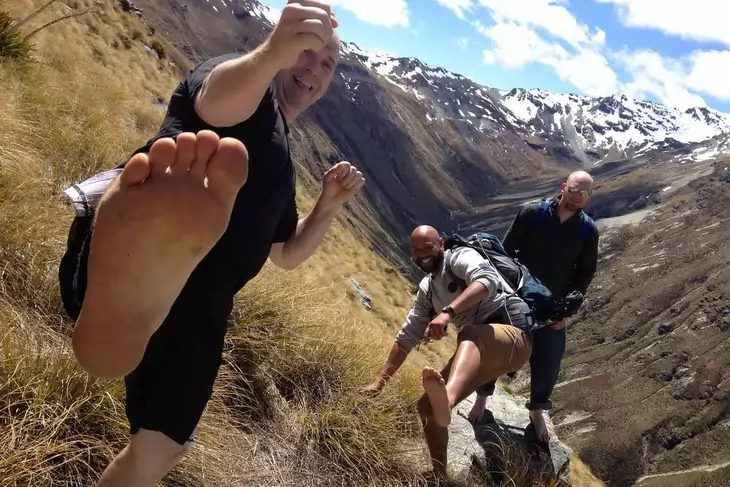
Today, we are going to talk all about this new hiking phenomena. Is it something you should be considering? Are there any tips that you need before you embark on the same? Read on to get the full details. If you’re a hiking enthusiast like we are, then this is a post you won’t want to put down.
Why you should try it out
Walking barefoot is not something entirely new. Back in the day, people had no shoes and were used to going everywhere without them. In fact, Reflexologists are quick to point out that walking barefoot is therapeutic in a way because shoes constrict our feet so much that walking becomes a task even without us noticing it.
The feeling of the mud and dew beneath our feet is enough to heighten our senses. It makes you feel like you are part of a natural force and you will learn to appreciate nature even more. Moreover, the different textures on the ground give our feet so much pleasure. Maybe it’s time to ditch that spa for the amazing foot rubs and start walking barefoot more. It will cost less, and you’ll feel so much better afterward.
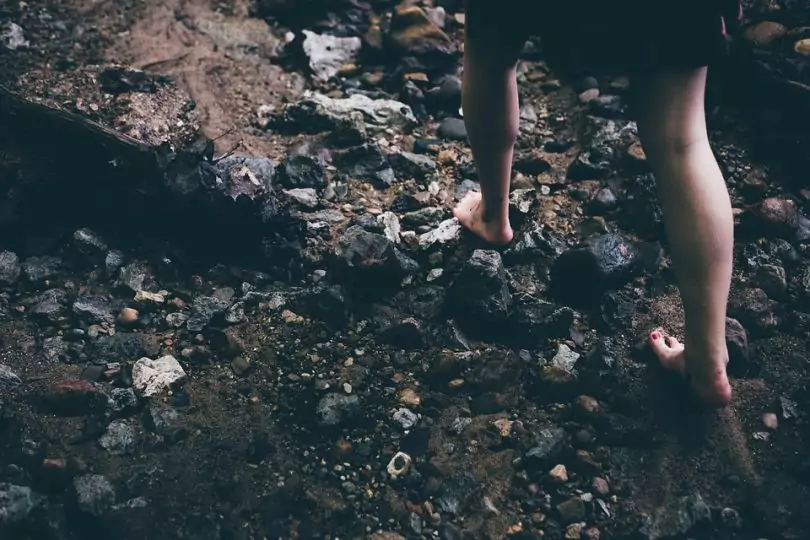
Did you know that we limit soil erosion just by taking off our shoes when outdoors? Our bare feet make less of an imprint on the ground as compared to boots. This, in turn, helps keeps soil intact on the ground and limits instances of soil being carried away. Isn’t knowing that just by walking barefoot we contribute to a better environment such a relief?
Preparation tips for beginners
You don’t just wake up one day and decide to go hiking barefoot. Well, you can, but unless you’re fully equipped with some facts, then it’s going to be a little harsh for you. The whole phenomena became a movement now, and we’re sure it’s quite intriguing to so many hikers out there, and many would want to try out at least to experience for themselves.
If you want to start barefoot hiking, therefore, you can start with a few exercises to fully prepare you for what you will encounter. It’s all about starting small and progressing to becoming a pro-barefoot walker.
Check our piece on exercises to boost ankle strength to prepare yourself for walking barefoot.
Spend more time barefoot at home
It’s time to ditch those sandals and start walking shoeless around your house and more so, your back yard. This will prepare your feet and get them used to the different textures so that when it comes to the actual trail, you will have few problems getting used to the feeling.
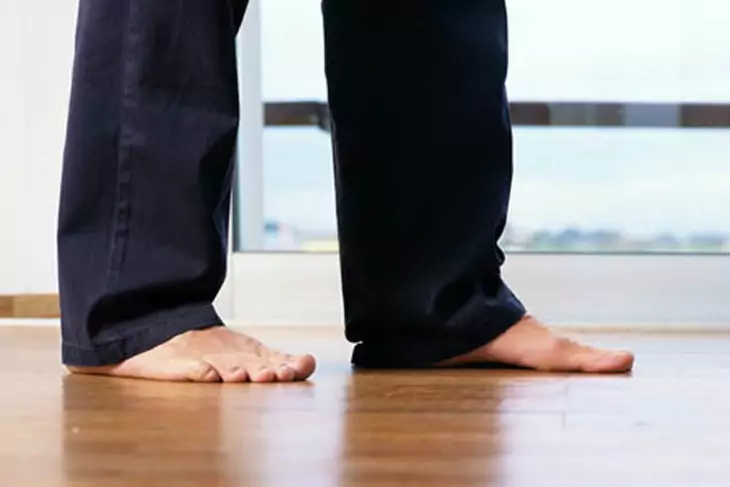
Practice stepping straight down
The majority of the times we’ve gotten injured while walking was because we didn’t step the right way. You should learn to step straight down and should avoid dragging your feet or shuffling to prevent coming into contact with items that might hurt your feet.
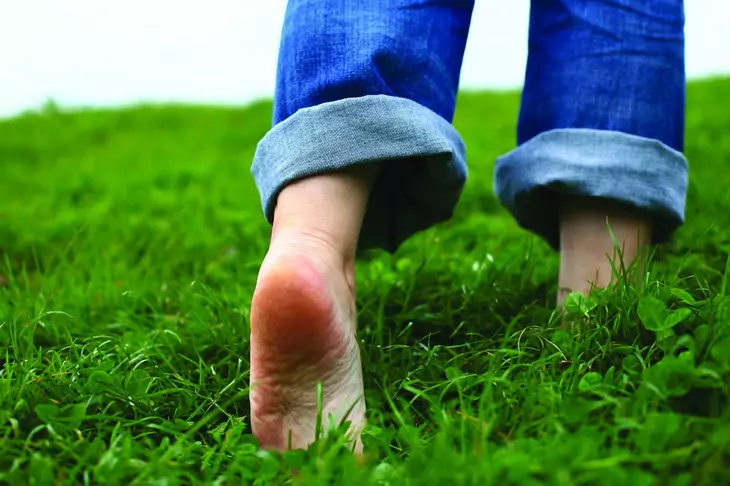
Get familiar with the new sensations
If you have never walked barefoot before, you will undoubtedly encounter different feelings the first time you try it out. It’s important that you know there are just new sensations and there is nothing more to it.
Do not let that discourage you from the path you have chosen to follow. The nerves in your feet adjust pretty quickly, and you will be walking comfortably within no time.
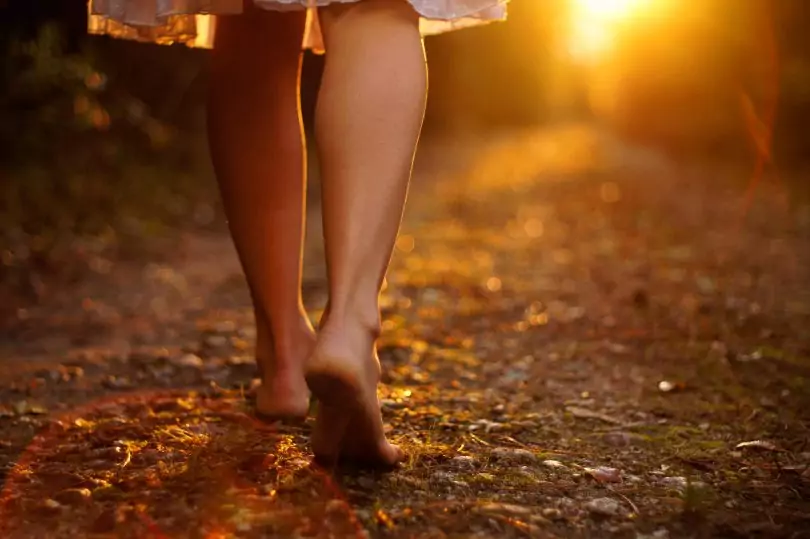
Focus on the path ahead of you
When hiking, you have come across sharp objects or stones that could have hurt you even with your boots on. Imagine encountering the same without anything protecting your feet.
This is precisely why you should practice looking straight ahead when walking. Do not lose this focus because you might fail to see an object that could be a hazard, just three or two paces in front of you.
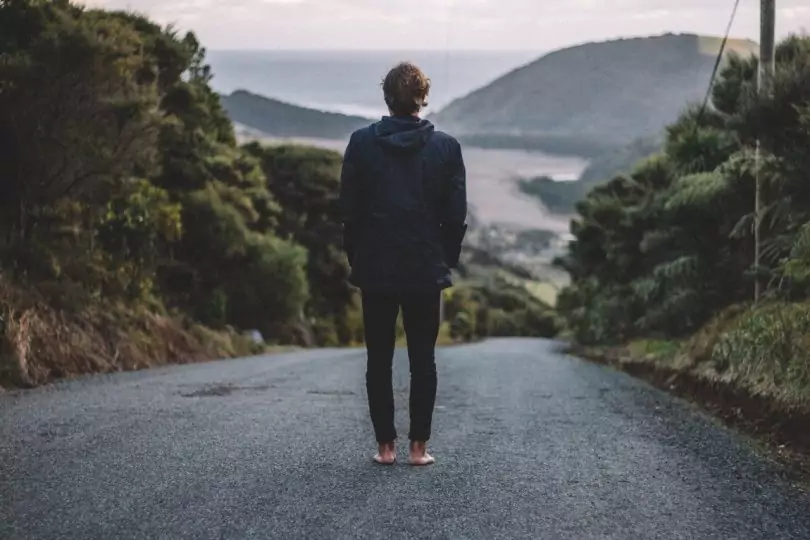
Learn to balance your weight on the balls of your feet
We have grown up walking the wrong way- letting our weight on our heels instead of keeping the weight on the balls of our feet. Why is this important?
The balls have a larger surface area than the heels, which helps them absorb more weight and makes walking a very easy task. You can try placing more weight on the forward of your feet for each step you take, increasing the pressure every time, which gets you used to it quickly.
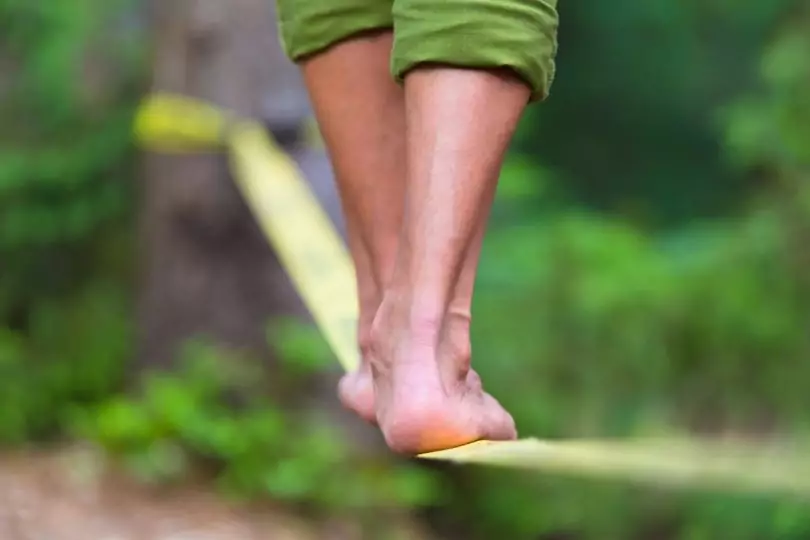
Always be aware of your surroundings
Walking barefoot is new for you, and therefore you should try being conscious of your surroundings, especially what you step into. More often than not, you will find yourself walking right into a puddle or stepping on a stone. You need to learn how to retract your steps as quickly as possible and if it’s too late for that, just shift your weight to other parts of the body, like the heels.
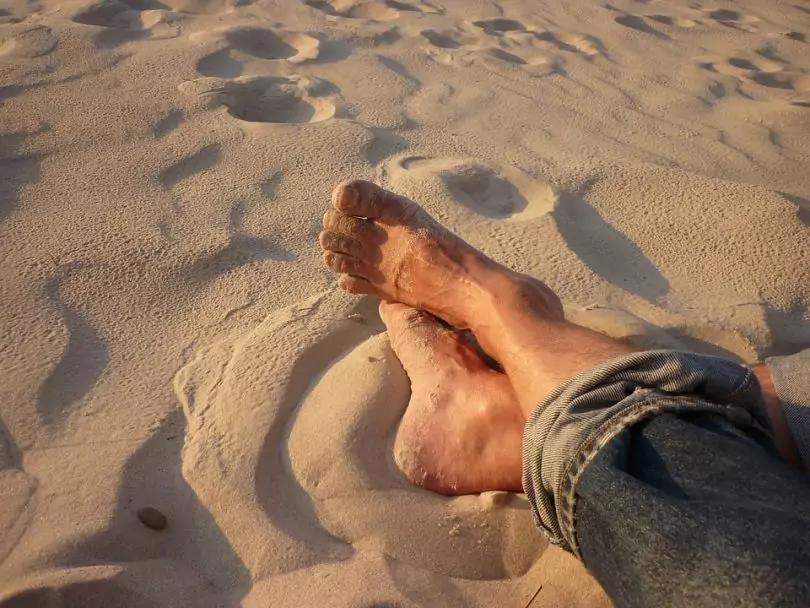
Pros & Cons
Everything on this earth has its flaws and its advantages. I have learned that it’s crucial to go through the good and the bad before making a decision. And as such, barefoot hiking does not fall short of such an assessment. Evaluating yourself in regards to this list will help you know for sure whether you want to go hiking while barefoot or not.
Pros
- You don’t have to be a professional hiker to give this a try. Absolutely anyone can go hiking barefoot since it does not need any technical knowledge.as long as you have the passion and you want to experience something new, then you can definitely give this a shot.
- You get more in touch with nature. If you love hiking, then you must love nature and all that comes with it. Trekking without shoes gives you a chance to connect with nature, and apart from the therapeutic benefits, you also feel closer to nature.
- It’s safer for the environment. Your bare feet will hardly leave an imprint on the ground as compared to hikers with boots. This prevents soil erosion and keeps the environment-friendly for everyone.
- You have better traction. This may come as a shock to you, but you are better off barefoot in the jungle than in boots. When in uneven terrain that is either muddy or slippery, your bare feet give you better traction, and therefore you can cling better to the ground.
- It’s good for your joints and nerves. Walking without shoes makes your joints to produce a natural gait that helps you walk better than when in hiking boots. As a result, your joints become stronger and flexible and can withstand pressure without straining. Moreover, your nerves get to experience every sensation felt on the ground which will make your whole hiking experience worth it.
- It’s less costly. You might not think about it in this way, but you won’t have to keep buying footwear for your hiking expeditions every time. We all know trail boots don’t come cheap. How about you save some money by not buying any shoes at all the next time you go hiking?
Cons
- You will get dirty. We are sure there are those of us who don’t mind getting in touch with dirt once in a while. If you fall under the category, then you will love walking barefoot. On the other hand, if you squirm every time you imagine touching the ground or getting in contact with ‘germs,’ then you may just have to reconsider the whole thing. This is because when hiking, you will be stepping on actual dirt and mud with your bare feet. Certainly, this is not ideal for you if the thought of a little dirt makes you cringe.
- You will be prone to injuries. When you are hiking in boots, your feet are protected against any injuries. It’s different when you are barefoot. Your feet are exposed, and therefore you can get injured any time- step on a sharp object, a stone or worse, sprain your ankle due to a simple misstep. You are also prone to viral, fungal and bacterial infections such as athlete’s foot and hookworms, which take a long time to heal.
- Sore feet. You may not want to move a day or two after hiking while barefoot. Your feet and muscles will have become so sore that not even your regular balm can help. The good news is, you become used to the whole shoeless hiking within no time, which means, no more sore feet
- Extreme weather conditions. Sometimes the weather just goes south while you’re in the middle of a trail, and you have no choice but to continue with the trek. During winter, the ground can become frigid, and during summer, it starts to burn your feet. This makes it harder for you, but indeed, not too hard not to keep hiking. When the weather becomes extreme, you can wear a pair of minimalist hiking shoes that you should always have in your backpack. They sure do come in handy in such situations.
And as if that’s not all, you risk being called a ‘hippie’ just because you walk barefoot. But since you have all the facts with you, any sort of name calling shouldn’t get you off your path.
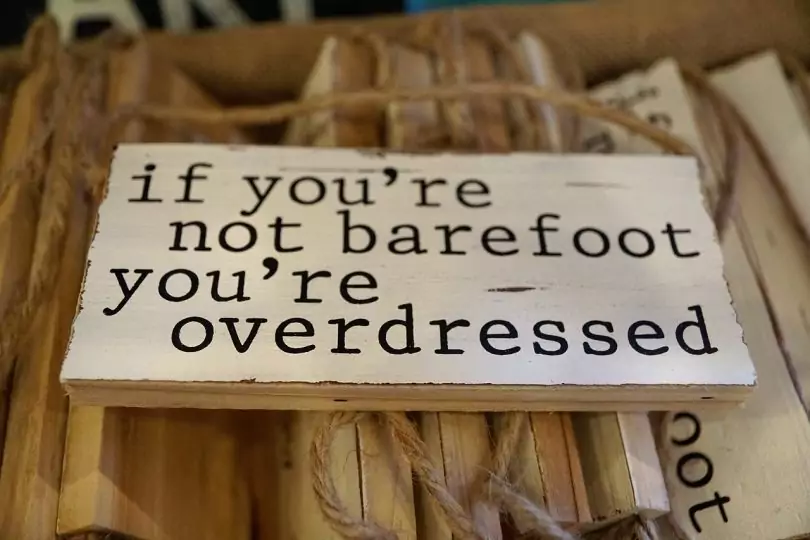
How to ensure you enjoy barefoot hiking
For every new experience, there is always a skeptical beginner who feels like it may be the worst decision they have ever made, usually, even before they engage in the actual activity.
We are allowed to have doubts every once in a while and in this particular case, I would not be surprised if you kept bailing on going trekking while barefoot just because you thought you would not like it. There are a few tricks that can put your mind at ease and have you on that trail within no time.
Contact your physician
This is the first step you should take when you decide to go on the trail barefoot. There are some conditions like diabetes that will make it harder for you when you are out there. Let your doctor conduct a thorough examination and clear you for the hike. After all, it’s better to stay safe than be sorry.
Barefoot hiking group
As a hiker, do you have people you go trekking with or you enjoy doing it alone? You should consider joining a barefoot hiking group in your area so that you can encourage each other as you embark on a new activity. If there are no groups formed yet, why not start one yourself? I’m sure you will get to meet like-minded people who will have as much fun hiking with you, and you will also get to learn a lot in the process.
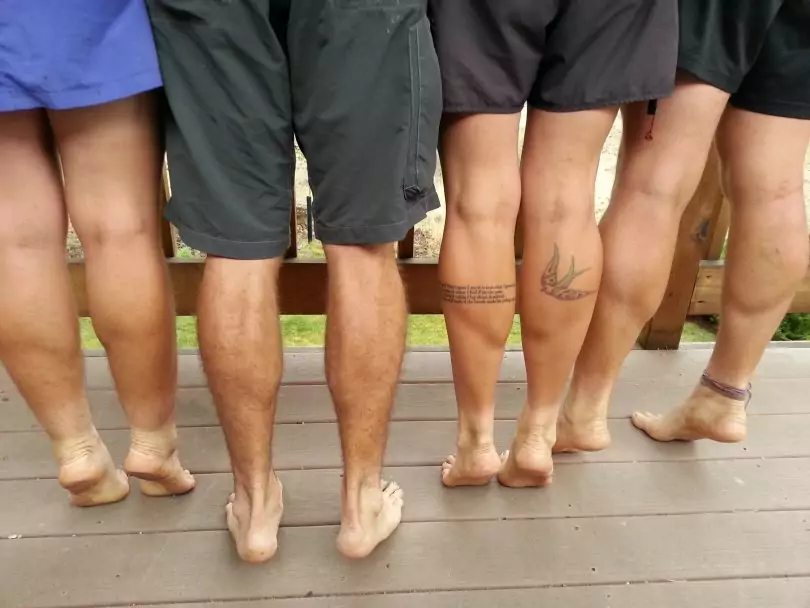
Choosing the right trail
As a beginner, you don’t want to get caught up in uneven terrains laden with rocks and roots. Leave this for the experts’. Go for softer grounds, which are smooth and are mostly dirt and pine needles, and you will have no problems maneuvering the trail.
Moreover, you should be extremely careful when crossing streams and rivers. Ideally, these may seem like the safest places, but the most important rule of hiking is to avoid stepping on places you can’t see the ground. River banks are muddy, and therefore they may be swamped with rocks, broken glass or worse, metal.
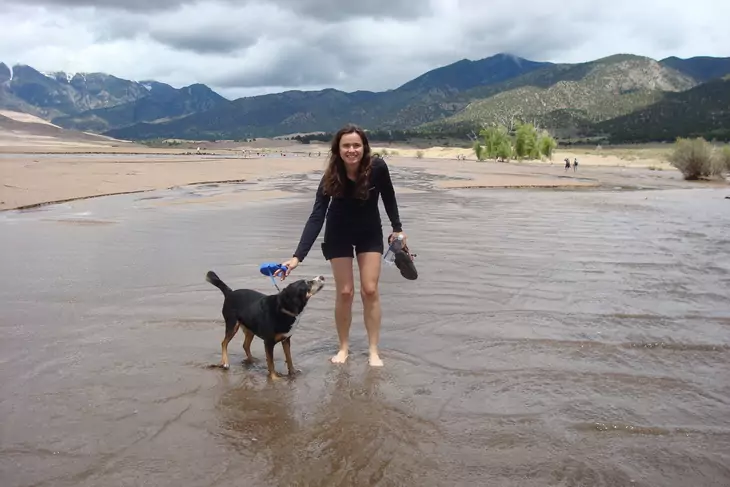
Research
You can never underestimate the power of proper research, especially if a niche you’re unfamiliar with. Conduct intensive research beforehand about the trail you will be walking on and the plants you should avoid like nettles and thistles, which sting pretty bad. For instance, I’m allergic to poison ivy, so I know how to avoid coming into contact with it.
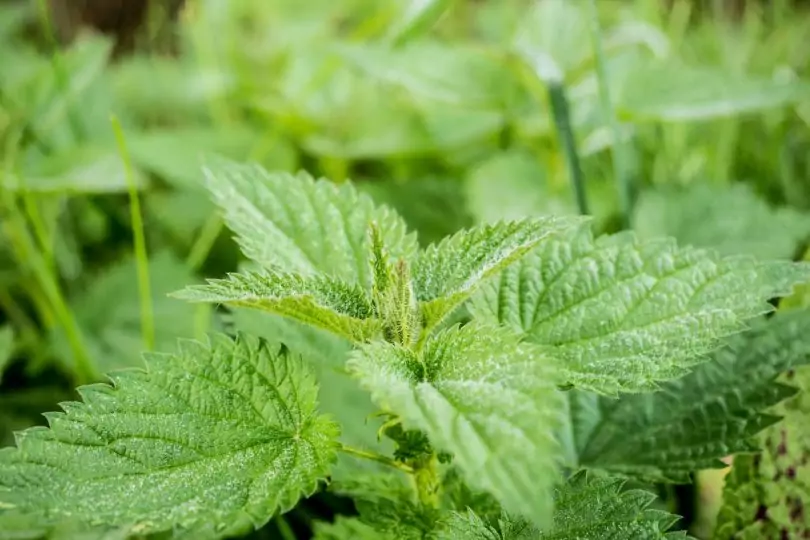
Grooming
There are a few things that you can do to help ease the whole experience. To begin with, ensure your nails are well trimmed before the actual hike. This is to avoid being caught up in roots, or snagging nails on the trail.
Try keeping your feet and ankles free and light by wearing shorts. The last thing you need is clothing that interferes with your walking. To top it off, carry enough water to keep you hydrated all through and pack tweezers and bandages beforehand. Since it’s your first time trekking barefoot, you will get a few cuts and bruises as you are not used to the trail just yet.
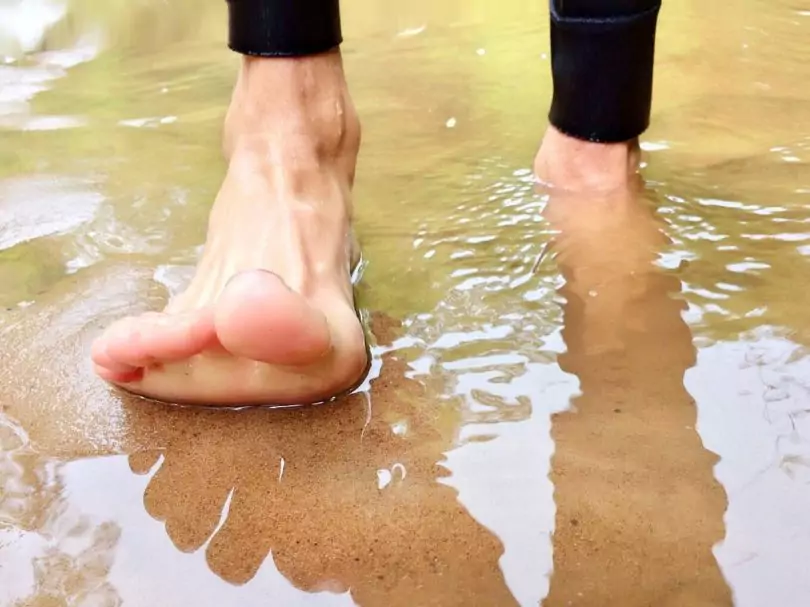
And that’s not all. For the long trails which take you a couple of days, you should be worried about getting sore or cracked feet that can hinder your movement. Each day after returning to your camp, wash your feet well and massage them with a foot balm after which, you should put on thick socks or camp shoes for the night. Heating equal amounts of beeswax and olive oil works great for a foot salve.
When you get home from your hike, make sure to check for any ticks on your body. You may not have any, but it helps to be thorough and to check yourself out. You can make your own insect repellents to keep those pests away – check out our article on this.
Still not convinced?
If you are still unsure about trying out hiking without boots, how about you carry a pair of ‘five fingers’ to help you walk on the hard terrains? Trekking poles should also come in handy because you will get some weight off your feet, especially if you’ve succumbed to a few injuries. They may reduce your pace, but if this is what you need to get used to the trail, so be it. You should also pack a pair of flip-flops to help you cross terrains that will cause pain to your feet.
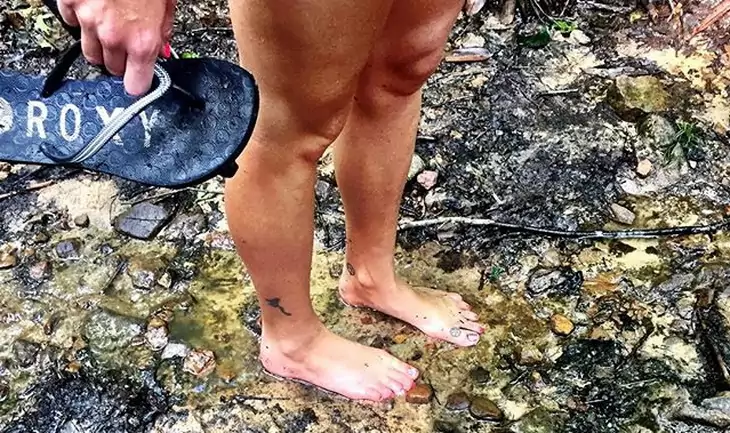
It’s natural to take much more time examining the ground for objects that could harm you the first few times you go hiking barefoot. With time, you will get used to it and realize that you don’t take as much time as on your next step. Your feet will get used to the ground, and your senses will be heightened. You will be covering long distances within no time. Make sure you read our piece on the best first aid kits to keep you safe on the trail.
And finally, do not go out on the trail alone, especially for the first time. Get a group or a friend to accompany you. They don’t have to be professional hikers; they can just tag along if they are interested in hiking too.
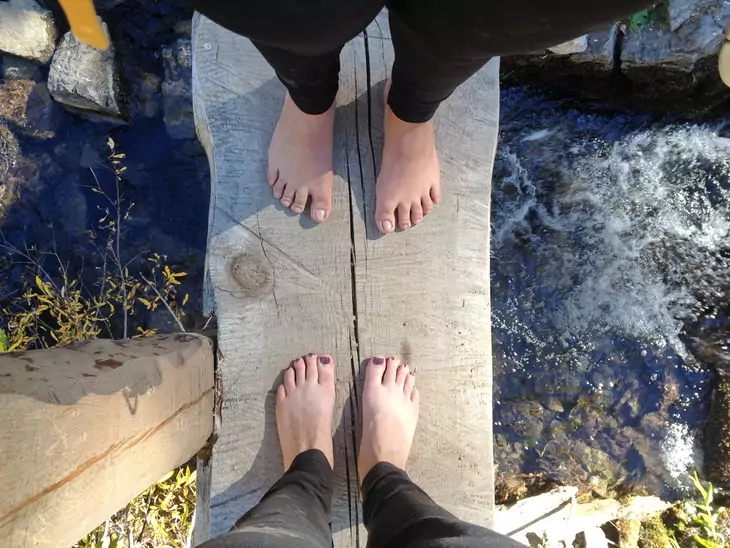
Discovering new trails together and just undergoing something new will make for a much better experience. If you don’t get anyone to keep you company, then just go alone. You might end up enjoying the hike even more.
It’s also not advisable to go walking barefoot on farms and on tropical countries. Worse still, you should not go on shared showers or hostels on your bare feet because you are prone to tetanus and other parasitic diseases.
Wrapping it up
You don’t always have to follow trends as they emerge. You may end up losing a little bit of yourself each time you do. Barefoot hiking, however, is one of the trends you should not want to miss out on if you are a hiking enthusiast.
This is your one chance to feel part of something greater, to contribute to the environment and feel transformed while at it. You don’t only get to exercise, but you will feel rejuvenated and like a veil has been lifted after the whole experience. You start seeing nature in an entirely new light, and your hiking experience will never be the same again.
It’s definitely not for the faint-hearted, but you will never know how it feels until you try it out. We have gone over all you need to know about walking barefoot, and it’s now up to you to make an informed decision. Is it something you finally want to be part of?
For more tips on how to walk correctly to boost your help, see our article on this interesting topic.
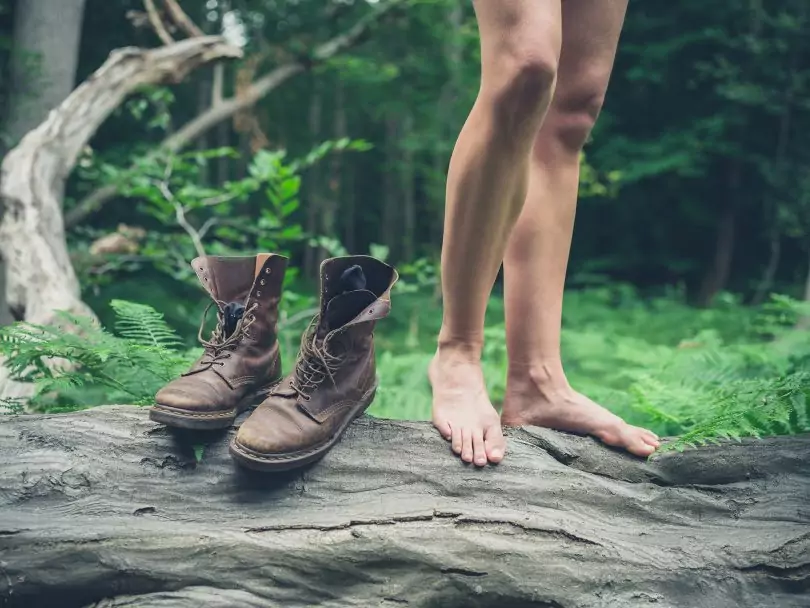
We hope you have enjoyed reading today’s post. Let us know your thoughts and concerns, and it would help if you shared the post with your family and friends.

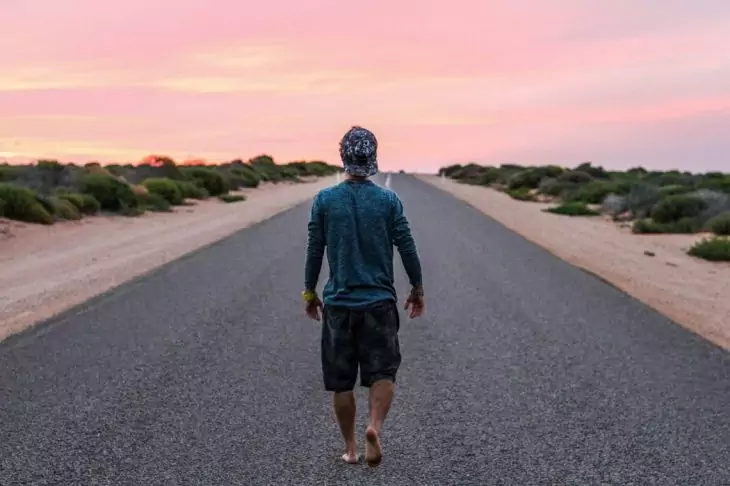

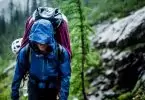


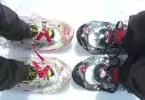
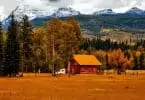
Ouch! I can’t even walk on my lawn barefeet! What happens to all the twigs and pointy rocks on the floor? I’m less worried about the injuries than the pain that comes with every step. Has anyone tried this before and what was their detailed personal experience?
Sure some items are going to be uncomfortable to step on, no matter what you have on your feet. You do need to be careful, but overall barefoot hiking is something to get used to, and you just have to watch your step!
As far as I think barefoot hiking is good for our health. I do not mind giving a try while I am in a hike. We should find the best trail to do it as you have mentioned so we can make sure there is no harm for our self.
We absolutely agree!